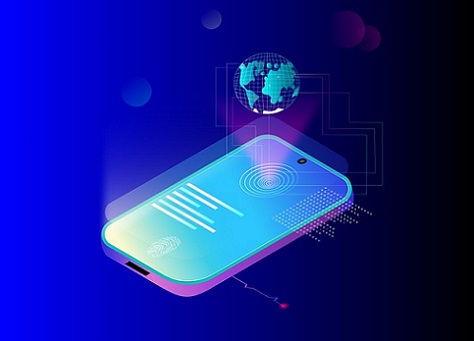Driven by advancements in technology and shifts in user expectations, the landscape of mobile app design and development has undergone remarkable transformations over the past decade.
As we venture into 2024 and beyond, the evolution of User Interface (UI) Design in mobile apps continues to accelerate and new technologies to create more intuitive, engaging and immersive user experiences continue to expand.
In this article, we will explore the key changes in UI design, emphasizing the role of AI-driven interfaces, voice interactions and immersive experiences, that will shape the future of app design and development.
The shift to AI-driven interfaces
Modern UI design can benefit tremendously from Artificial Intelligence (AI) technology as it offers extraordinary personalization and efficiency. For example, AI-driven interfaces can be used to analyze user behavior, preferences and patterns, so your application can deliver tailored content and suggestions to your customer base, significantly enhancing user engagement and satisfaction.
Many mobile application development companies are now leveraging AI to create dynamic UI elements that adapt in real-time, offering a more personalized app experience that was once possible only in the realm of science fiction.

The rise of voice interactions
Voice interactions have surged in popularity, thanks to the widespread adoption of virtual assistants like Siri, Alexa and Google Assistant. The voice interaction trend is reshaping UI design, as mobile apps incorporate voice commands for hands-free operation, making them more accessible and convenient.
App development services are increasingly integrating voice interfaces to cater to users’ demand for seamless, conversational interactions with their apps and devices. This development in technology not only enhances accessibility but also opens new avenues for app functionality and user engagement.
AR and VR for immersive experiences
Augmented Reality (AR) and Virtual Reality (VR) technologies are pushing the boundaries of immersive app experiences. By overlaying digital information onto the real world or creating entirely virtual environments, AR and VR offer users novel ways to interact with apps.
A mobile app development agency, particularly in regions like Guyana can leverage the growing popularity of mobile applications by exploring AR and VR technologies to offer immersive educational, entertainment and shopping experiences. The interactive features of a mobile application can be taken several notches higher through clever implementation of AR and VR, resulting in unparalleled user engagement.
Designing for foldable and wearable devices
The advent of foldable smartphones and wearable devices introduces new challenges and opportunities for UI design. App development agencies in Guyana and elsewhere are tasked with ensuring their apps provide seamless experiences across a variety of screen sizes and devices. This necessitates flexible, responsive UI designs that can adapt to different devices while maintaining the app’s usability and aesthetic appeal.
Emphasizing minimalism and efficiency
As technology advances, so does the importance of minimalist design. Users increasingly favour interfaces that are clean, intuitive and free of unnecessary elements that impede easy interactions with the app.
A minimalist approach improves usability as well as speeds up app performance, a crucial factor given the global push towards faster, more efficient mobile experiences. In the current user-centric digital environment, app development services are focusing on simplifying UI designs to enhance user engagement and ensure quick, responsive interactions.

Prioritizing privacy and security
With growing concerns over data privacy and security, UI design must also evolve to incorporate transparent and secure user experiences. Features such as biometric authentication, end-to-end encryption and clear privacy settings are becoming standard components of app UIs. As mobile app development agencies in Guyana and around the world emphasize security, users can enjoy a safer app experience.
The future of UI design in mobile application
As we look to the future, it’s clear that UI design will continue to evolve with technological advancements and changing user expectations. We can expect to see further integration of AI and machine learning, offering even more personalized and anticipatory user experiences. Voice and gesture controls will become more refined, making interactions more natural and intuitive. Meanwhile, the continued expansion of AR and VR technologies will open new horizons for immersive app experiences.
New Updates 2025 – Trends in business mobile app development
Beacon technology
Using the beacon technology, retailers and businesses can collect data or deliver personalized, location-based advertisements to people near the business location. This is made possible using a small physical device called beacons that send radio signals to smartphones nearby. Mobile apps with specific code that activates Bluetooth scanning can recognize a beacon’s unique signal, and when a user approaches certain locations, the app searches for these signals and responds accordingly. This creates opportunities for retailers and businesses to send push notifications with messages that increase footfall and generate sales. A highly effective strategy if used correctly!
Internet of Things (IoT) app integration
IoT or Internet of Things is an exciting futuristic technology that allows devices to communicate with each other via the internet. By integrating IoT capabilities into mobile applications, businesses can explore innovative ways to leverage this rising technology for improved user experience, better customer service and increased sales. For Example, a grocery store can create a mobile application with IoT technology to communicate with a smart refrigerator to auto order diary, vegetable and other food items that are stored in a fridge.
Mobile commerce
While not a brand new concept, mobile commerce is a trend that continues to help businesses leverage mobile apps for increased sales and revenue. With secure payment methods like mobile wallets and other mobile payment mediums, consumers have started enjoying the convenience of shopping online on their mobile devices. Retailers and resellers will have many opportunities to increase their sales and conversions by integrating mobile commerce features into their app design and development.
Whether it’s for the market in Guyana or globally, embracing these evolving UI design trends will be key to delivering apps that are not only functional but truly delightful to use. Therefore, for businesses and app developers in Guyana, staying abreast of these trends is essential.
Partnering with a mobile app development agency skilled in the latest technologies and user experience (UX) best practices is crucial to creating successful apps that resonate with users. Contact us at Webfx. We specialize in web and mobile app development services for Guyanese businesses, following the best and latest design and development practices.
The evolution of UI design in mobile apps is an ongoing journey and the expertise of app design and development professionals can guide you through it for a smooth and seamless app development experience.
